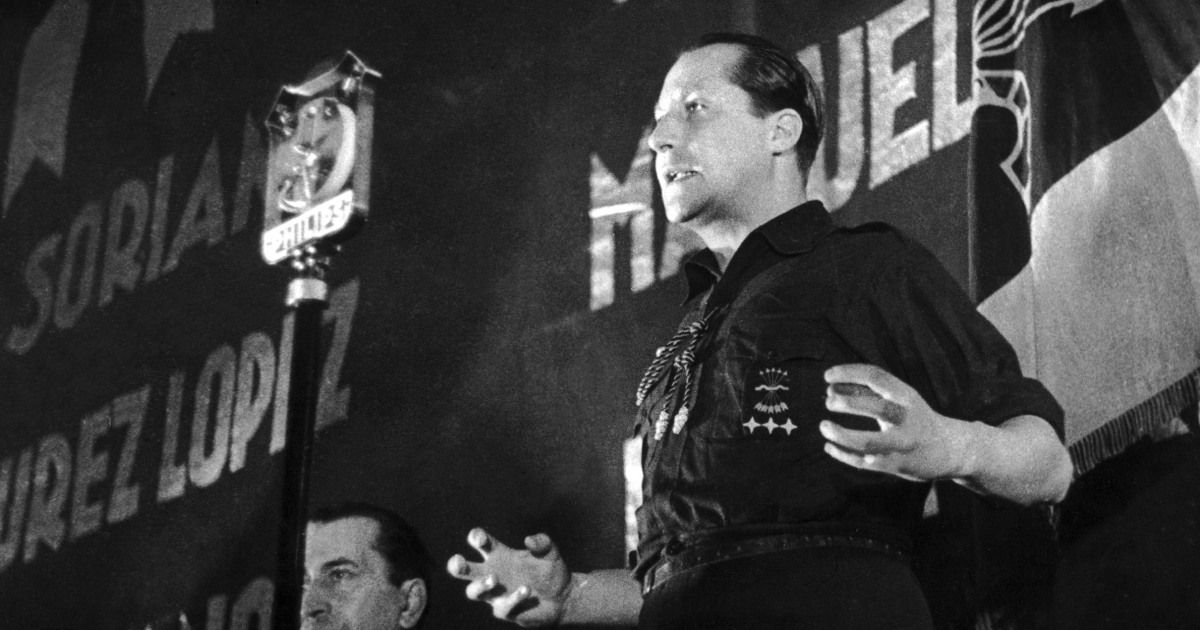The remains of a fascist leader whose movement supported General Franco’s dictatorship were unearthed and reburied on Monday, reigniting Spain’s debate over its complex past and angering far-right activists.
The Spanish government has ordered the exhumation of the body of José Antonio Primo de Rivera, who founded the fascist Falange movement, from its resting place in a massive mausoleum on a mountainside 40 miles from the capital Madrid. He was later reburied in a city cemetery in a private family ceremony.
The move, carried out while a small group of supporters chanted and gave fascist salutes, is part of an effort to prevent the glorification of the country’s totalitarian past, which comes as the far-right seeks political gains across Europe.
It follows the exhumation of the remains of General Franco from the same location, formerly known as the Valley of the Fallen, in 2019, after he was originally buried there upon his death in 1975. The site was built in part with forced prison labor to commemorate the fascist war. victory in the civil war and for many the site represents the horrors of the war and the subsequent dictatorship of Franco.
As with Franco’s re-entry, Monday’s move angered Spain’s current far-right movement, which sees Primo de Rivera and Franco as nationalist heroes. Santiago Abascal, leader of the populist Vox Party, has accused the Government of Spain of transferring a patriot who «gave his life for Spain.»
The vice president of the party, Jorge Buxadé, said on Twitter: «If they do not respect the dead, does anyone think that they respect the living, the workers, the peasants, those who have a vocation to serve Spain?»
Vox has asked for a «reconquestof Spain and has suggested building a wall around the Spanish enclaves of Ceuta and Melilla in North Africa.
Vox became the third largest political party in the country after the 2019 national elections, with 3.6 million votes and 52 lawmakers in the Congress of Deputies, the lower house of Spain’s Parliament. Opinion polls say the party remains the third most popular, with around 15% of national support.
Under a new Democratic Memory law passed last year, the site officially returned to its original name, Valle de Cuelgamuros. Spain’s socialist government plans to turn the site into a lasting tribute to the 500,000 people killed during the civil war, which lasted from 1936 to 1939.
The president of the Spanish government, Pedro Sánchez, said when the law was approved in October that «it would settle the debt of Spanish democracy with its past.»
The mausoleum, with its 500-foot spire and cross, was partially built with the labor of Republican prisoners under Franco’s orders.
The Minister of the Presidency, Félix Bolaños, told reporters in Barcelona on Friday: «No person or ideology that evokes the dictatorship should be honored or extolled there.»
«It is one more step in the redefinition of the valley.»
This will mark the fifth time the body of José Antonia de Rivera has been exhumed since he was shot dead by a left-wing Republican firing squad in 1936, such is the strength of sentiment about his final resting place.
His body was originally buried in two different mass graves in the southeastern coastal city of Alicante. Two years later he moved 500 kilometers to San Lorenzo de El Escorial, near Madrid, where the Spanish royal family is traditionally buried. His body was transferred to the Valley of the Fallen in 1959.
Primo de Rivera’s family said in a statement to local media that they would now move the remains to the Madrid cemetery and rebury them in a private ceremony.
He was the son of Miguel Primo de Rivera, who ruled Spain as its dictator from 1923 to 1930.
Nazi Germany sent a delegation of Hitler Youth activists to place a wreath at her grave in 1943.
Long-standing plans are underway to allow people access to the crypts of the Cuelgamuros mausoleum, which is believed to house the unidentified remains of 34,000 people, including many victims of the Franco regime.
Families have been fighting for years for the right to identify the bodies of loved ones who died during the war and are suspected to be buried in the crypt.
Spain is one of many European countries grappling with its 20th century history, including many affected by historical debates about the extent of Nazi collaboration during the Holocaust.
Julius Ruiz, an expert on Spanish history at the University of Edinburgh in the UK, said Primo de Rivera’s legacy was used by supporters and critics alike to support contemporary political goals, with regional elections on the horizon in Spain.
«He played no role in the Civil War at all, he was in a Republican prison and in fact during the months he was alive he advocated conciliation, he talked about how people should unite, how the war was a tragedy,» Ruiz said. to NBC. News.
“But, of course, the problem here is that, regardless of the actions of the man himself, Franco used it, and José Antonio did not particularly like it, as a symbol to legitimize his regime on the basis of the single party that was created. in 1937″.
Ruiz added that with more figures from the Franco regime yet to be unearthed, this may not be the last controversial moment in Spain’s process of establishing its «democratic memory.»

